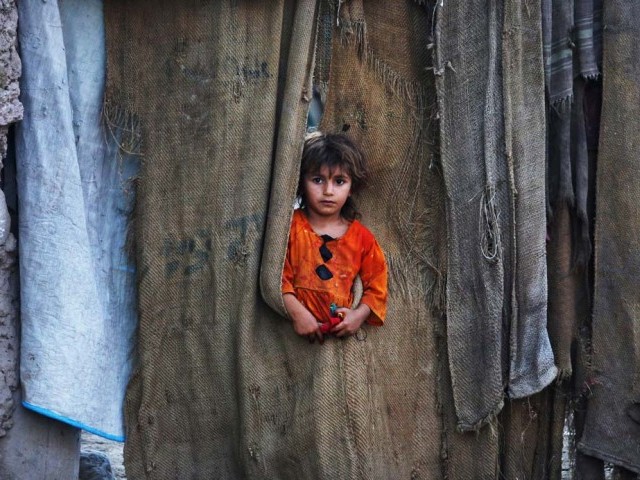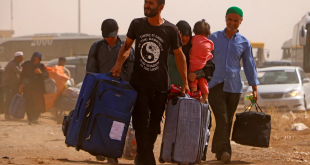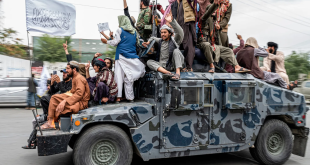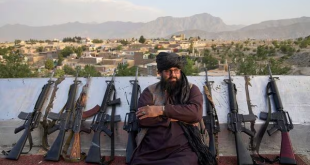 The United Nations High Commissioner for Refugees (UNHCR) is in the spotlight as Afghan refugees in Peshawar have complained about discrimination, lack of basic facilities and corruption in the voluntary repatriation center in Chamkani area. Tens of refugees visit the center on daily basis as Pakistani government has set December 31, 2016 as final deadline for Afghans, both registered and unregistered, to leave the country. Scores of people are forced to wait in scorching heat for hours. Searching for shade to get some relief has become a herculean task for the helpless Afghan refugees. They are feeling abandoned as staffers at the repatriation center are treating them like customers. As an established practice, most of traders are fleecing customers.
The United Nations High Commissioner for Refugees (UNHCR) is in the spotlight as Afghan refugees in Peshawar have complained about discrimination, lack of basic facilities and corruption in the voluntary repatriation center in Chamkani area. Tens of refugees visit the center on daily basis as Pakistani government has set December 31, 2016 as final deadline for Afghans, both registered and unregistered, to leave the country. Scores of people are forced to wait in scorching heat for hours. Searching for shade to get some relief has become a herculean task for the helpless Afghan refugees. They are feeling abandoned as staffers at the repatriation center are treating them like customers. As an established practice, most of traders are fleecing customers.
News Lens in its report on Afghans at the center has sketched a picture which gives good details about the problems faced by the refugees. It also tells that how police and security guards at the center, run by the UNHCR, are getting a bribe of 10,000 Pakistani rupees from a family to enter the center “out of turn”. This is not the first news report on the anomalies in the UN body—thought to be the only most trustworthy supporter and savior of the refugees and stateless people.
Reputation of the UNHCR in Pakistan is at stake. It will not take long when more stories about corruption and discrimination in the center will emerge and flood the print, electronic and social media. The global body could lose trust of the most deprived people on the earth if the problems were left unaddressed. There are many good people in the UNHCR’s Pakistan chapter. The UN body helped thousands of people in the recent years. However, people remember only the missed goal of a goalkeeper.
When Afghans are harassed by Pakistani law enforcement agencies, they find it hard to brave another shock—corruption and lack of facilities outside and inside the registration center—especially by the global agency with mandate to help refugees. The refugees are in their right to demand facilities and indiscriminate procedure. When a snail with no legs and bones and without support of others can carry a heavy shell on its back then why the UNHCR officials in Peshawar are not helping the refugees? They shall study the snail and learn from it to improve their performance.
The international community is supporting the UNHCR across the globe. The commissioner for refugees can resolve the problems in short time because the body has many supporters to address the lack of human and financial resources. Seemingly, the UNHCR chapter in Pakistan has evolved itself according to the bureaucratic culture of the country. In the neighboring country it takes tireless efforts, under the table money, and several days to complete an official procedure.
It is worth pondering that the UNHCR was the first along with the Afghan government when informed about the final repatriation deadline. If the commissioner had technical problems, it could have raised up the issues with Pakistani officials at that time. Similarly, the Afghan government and refugees are also worthy of criticism. The Afghan ministry for refugees and repatriation is doing little to help the returnees. On diplomatic front it failed to extend the deadline. Likewise, it also failed to draft a plan in time to bring the refugees to their homeland with dignity. Pakistan’s decision has not come as a bolt from the blue. It was expected.
Similarly, most of the nation has the habit to pay the utility bills etc. on the last day. Afghan refugees are also rushing to the center at the eleventh hour. We have adopted this mindset for decades. To make the process easy, we pay bribes. Without changing this mindset, there is no progress and end to corruption.
 Afghanistan Times
Afghanistan Times



